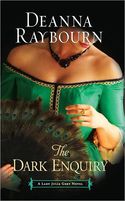
 I love chatting with book groups, and one of the topics they ask about most often is how much liberty I’ve taken with Victorian society. They point out that my characters don’t always fit in with the stereotypes we have of how people in the 19th century behaved. I have married characters who enjoy working partnerships with each other; I also have characters who engage in illicit sexual relationships. I have women making their own decisions about money, and I have characters who are gay.
I love chatting with book groups, and one of the topics they ask about most often is how much liberty I’ve taken with Victorian society. They point out that my characters don’t always fit in with the stereotypes we have of how people in the 19th century behaved. I have married characters who enjoy working partnerships with each other; I also have characters who engage in illicit sexual relationships. I have women making their own decisions about money, and I have characters who are gay.
Sound outrageously modern for Victorian times? You might think so, but the truth is that Victorians were far more like us than we often think. The 19th century was a time of tremendous change in every possible aspect of daily life. From technology to property rights, the Victorian age was marked by vast changes. A person born at the start of Victoria’s reign would have been accustomed to candlelight and ox carts; by the end of her life, electricity and motorcars were fast becoming the norm. They invented department stores and escalators; they started the practice of seaside holidays and ski vacations. Women who would have scorned cosmetics in the early 19th century were discreetly painting and powdering by the end of it, and telephones were being installed in all the smartest houses.
But it wasn’t just daily life that saw change. With the coming of new technology, the middle class began to enjoy unprecedented leisure, and thousands of women who had been liberated from cooking and cleaning and childcare suddenly found other causes. They agitated for their property rights, for the rights of children and workers and animals, and they demanded the right to vote. Others started lesbian communes and ran newspapers; they opened businesses and ran them successfully. They also ran for public office–somewhat less successfully–and they broke down the centuries’ old traditions that barred them from higher education. They experimented with vegetarianism and free love, with smoking cigars and wearing pants.
And they had sex–rather a lot of it! More than fifty percent of the lower-income brides married in Victorian London were pregnant as they marched down the aisle. Their better-heeled sisters in the aristocracy were able to conduct discreet affairs of their own, once they had provided the necessary “heir and the spare” to secure their husbands’ fortunes, of course. They educated themselves on birth control and visited doctors who stimulated them with medical vibrators until they left, rather more flushed and satisfied than when they arrived, and they shopped from newspaper advertisements to purchase contraceptive devices and abortifacients.
So, the next time you think of a chaste Victorian maiden, her eyes demurely downcast and her virtue intact, don’t forget her slightly wilder sister with her cropped hair and dungarees, waving a suffragette banner and slipping off to visit a lover.
To comment on Deanna Raybourn’s blog please click here.


No Comments
Comments are closed.